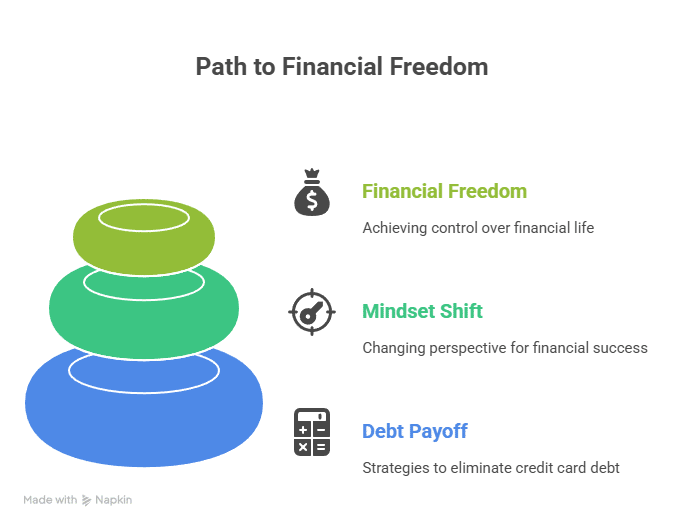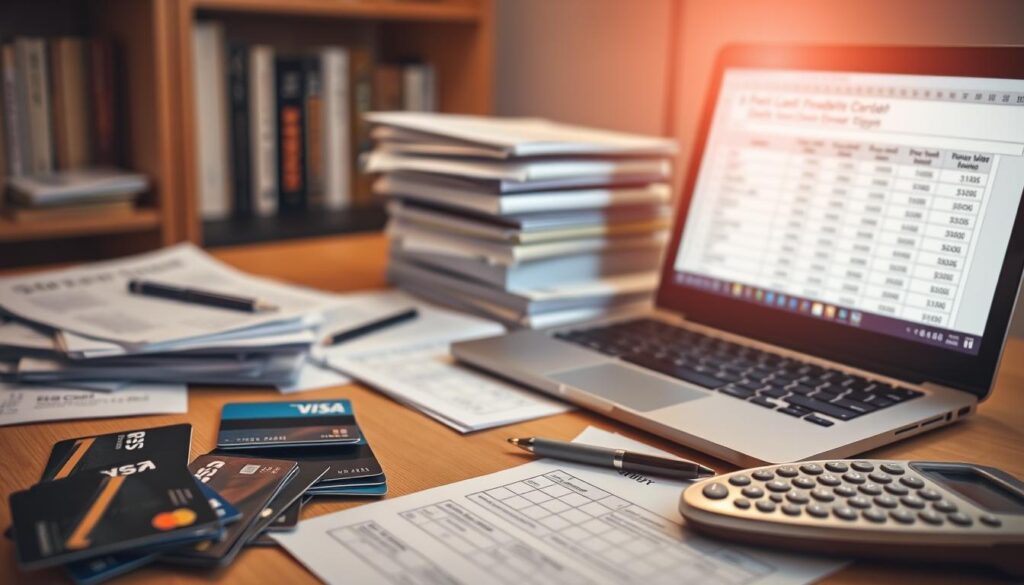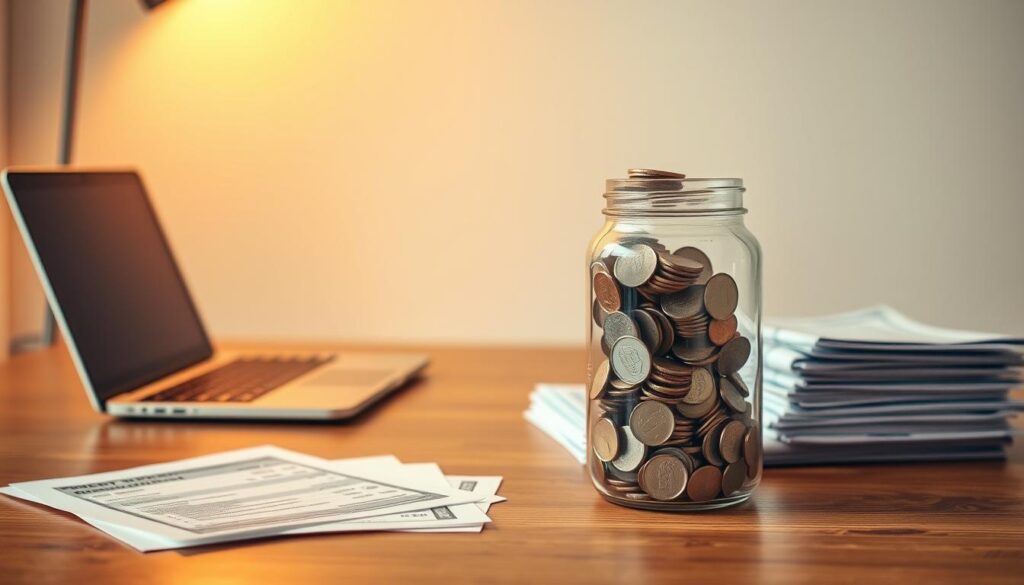For the people who lov🎧 Prefer listening? Hear this blog: Debt to Financial Success Guidee to hear
“Debt to Financial Success Guide: If you’ve ever felt overwhelmed by debt and wondered how to turn it into a stepping stone toward financial freedom, this guide will walk you through practical steps to make that transformation.”

“Struggling with mounting debt and seeking a path to financial freedom? You’re not alone. This guide offers practical steps to transform your financial life.”
Imagine if the credit card debt weighing you down could actually lead to financial freedom. This guide turns that notion on its head. Your path to success begins with strategies, mindset shifts, and proven steps. These will transform your debt challenges into credit card debt payoff motivation. It’s not just about numbers; it’s about taking back control. Let’s delve into how clearing your debt can unlock the financial freedom inspiration for a brighter future.
Key Takeaways
- Debt repayment can be a gateway to long-term financial stability.
- Small, consistent actions create momentum toward financial freedom.
- Psychological hurdles are as important as financial ones in debt payoff.
- Proven methods like the debt snowball or avalanche offer clear paths forward.
- Every payment brings you closer to rebuilding credit and confidence.
Managing credit card debt begins with understanding its nature and growth. It occurs when you borrow money through a card but fail to pay the full amount by the due date. Each unpaid dollar attracts interest, escalating small charges into a significant burden over time. Developing a mindset for paying off debt is essential. It fuels your motivation for clearing credit card debt.
What is Credit Card Debt?
Credit card debt is more than a monthly bill. It’s a loan where your credit card issuer advances funds, charging interest if not repaid in full each month. For instance, buying $500 worth of groceries without immediate repayment incurs interest. This makes the initial expense more costly than the original purchase.
Why People Accumulate Credit Card Debt
- Impulse purchases: Buying non-essentials “now” without a repayment plan.
- Emergency costs: Medical bills, car repairs, or job loss forcing reliance on credit.
- Lifestyle choices: Keeping up with social or material expectations despite income limits.
The Impact of High-Interest Rates
Interest compounds monthly, turning small balances into overwhelming totals. Consider this scenario: charging $2,000 at 18% APR and only paying the minimum ($40/month).):
A $2,000 debt could take 10+ years to pay, costing over $3,000 in interest alone.
Step-by-Step Debt to Financial Success Guide
This cycle traps users, making themindset for paying off debtcritical to breaking free.
The Importance of Paying Off Debt
Imagine life without the burden of credit card balances. The debt-free journey motivation begins here, where each payment brings you closer to financial stability. As you pay off debt, you free up money that was once consumed by interest. This unlocks potential for savings and achieving your goals.

Benefits of Being Debt-Free
- Monthly cash flow increases as payments vanish, boosting savings.
- Credit scores rise, lowering costs for loans and insurance.
- No more late fees or penalty rates drain your budget.
Many readers found this debt to financial success guide actionable and motivating…”
Emotional and Psychological Effects
Debt can cause significant stress, affecting relationships and self-esteem. Financial stress can also impact sleep and mental health. Imagine the financial freedom inspiration that comes from no longer fearing bill due dates. This clarity replaces anxiety, allowing you to focus on joy rather than juggling payments.
How Debt Affects Your Financial Goals
High balances can slow your progress toward major life goals like homeownership, retirement, or starting a business. Interest payments divert funds that could be used to build wealth. By paying off debt, you clear the path to:
- Saving for emergencies
- Investing in your future
- Living without “what if” scenarios
Every dollar freed from debt becomes fuel for your goals. This is the true power of the debt-free journey motivation.
you can also read https://pennypowerplay.com/smart-credit-card-use-wealth-freedom/
“You can bookmark this debt to financial success guide for future financial planning.”
Creating a Debt Payoff Plan
Creating a debt repayment plan requires action, not just theory. Credit card payoff strategies need to be customized for your specific situation. By following these steps, you can transform debt into a clear path and boost debt repayment motivation through a well-defined plan.

Assessing Your Total Debt Amount
Start by making a comprehensive list of all your accounts:
- Record every credit card balance
- Keep track of APRs and monthly minimums
- Mark down due dates to avoid late fees
Setting Realistic Goals
SMART goals are essential for focus. For instance, aim to pay off $2,000 in 12 months by reducing monthly expenses by $100.
“Goals without deadlines are mere wishes,” notes financial advisor Lizette Torres. Establish specific dates and amounts to track your progress.
You will love to read more
https://www.investopedia.com/terms/s/snowball.asp#:~:text=The%20debt%20snowball%20method%20is,continue%20paring%20down%20your%20debt.
Choosing a Payoff Strategy
Choose a strategy that aligns with your personality. Compare different approaches:
| Strategy | Process | Best For |
|---|---|---|
| Debt Snowball | Prioritize smallest balance first | Emotional motivation seekers |
| Debt Avalanche | Target highest-interest debts first | Math-driven planners |
Combine your chosen strategy with regular progress reviews. Celebrate each milestone to keep the momentum going. Remember, every extra dollar you pay can significantly speed up your progress.
Popular Debt Payoff Strategies
Choosing the right credit card payoff strategies is crucial for eliminating debt. Each method offers a unique approach to help you stay motivated to pay off credit card debt. Let’s explore the most effective options:

Debt Snowball Method Explained
Begin by listing debts from smallest to largest balance. Pay the minimum on all while focusing extra payments on the smallest. Once the smallest debt is paid off, apply that money to the next one. Quick victories boost your confidence. For instance, paying off a $500 medical bill first can give you an instant sense of accomplishment.
“The debt snowball method works because it gives you quick wins.” – Dave Ramsey
Debt Avalanche Method Explained
Focus on debts with the highest interest rates first. This approach mathematically reduces total interest paid. For example, tackling a $3,000 card with a 20% interest rate first can save you $600 in interest annually. Use a spreadsheet to track your savings over time.
Understanding Balance Transfers
Transfer high-interest balances to a 0% APR card. For instance, moving $5,000 from a 25% to a 0% APR card for 18 months can save you $1,250 in interest. However, be aware of transfer fees (usually 3-5% of the balance) and ensure timely payoff before the promotional rate expires.
| Strategy | Total Interest Saved | Motivation Boost |
|---|---|---|
| Snowball | Lower | High (visible progress) |
| Avalanche | Higher | Moderate (long-term focus) |
| Balance Transfer | Varies | Medium (temporary relief) |
Try combining these methods to find what works best for you. The key is to choose a plan that keeps you engaged and aligned with your financial goals.
Building Motivation to Tackle Debt
Every dollar paid toward debt is crucial, yet staying motivated requires more than discipline. These strategies transform big goals into daily victories, all without increasing stress levels.

Setting Short-Term Milestones
| Milestone | Example | Why It Works |
|---|---|---|
| 10% Paid | $500 paid on a $5,000 balance | Visible proof of progress |
| First Card Zeroed | Paying off a $500 card | Builds momentum physically |
Divide your total balance into smaller chunks, like 5% or 10%. Celebrate each milestone as a victory.
Celebrating Small Wins
- Save $5 in a “celebration jar” for every $100 paided
- Write down each milestone in a notebook
- Replace shopping sprees with a 30-minute walk or free hobby activity
Reward yourself without spending—like framing a “debt-free by X date” poster.
Find an Accountability Partner
Share your goals with someone who checks in weekly. Options include:
- Join online groups like Debt Free in 3 Years forum
- Use apps like Debt Payoff Tracker to share progress
- Meet monthly with a friend focused on their own debt
Regular check-ins turn debt payoff into a team effort.
Budgeting for Debt Payments
Effective budgeting is key to debt repayment motivation, turning income into progress. A strong mindset for paying off debt begins with every dollar aimed at your goals. Here’s how to organize your finances for faster repayment:
“A budget isn’t about restriction—it’s about directing resources toward what matters most.”
Creating a Monthly Budget
Start with a zero-based budget that assigns every dollar to a purpose. Use tools like Mint or YNAB to monitor spending. The 50/30/20 rule is a good starting point: 50% for essentials, 30% for wants, and 20% for debt and savings.
The envelope system uses cash for categories like groceries, preventing overspending.
Allocating Extra Funds to Debt
Direct tax refunds, bonuses, or side hustle income to high-interest debts. Once a debt is cleared, apply those funds to the next target, following the Debt Snowball method. Automate payments to ensure timely payments.
Cutting Unnecessary Expenses
- Downgrade streaming services or bundle subscriptions.
- Cook at home instead of dining out.
- Negotiate bills for internet, insurance, or phone plans.
Every small change boosts your mindset for paying off debt. These adjustments create momentum. Consistent budgeting builds the discipline to stay on track.
The Role of Emergency Funds
An emergency fund is not a luxury; it’s a vital lifeline to stay motivated to pay off credit card debt. Without it, unexpected expenses can lead to difficult decisions. You might have to charge emergencies or pause payments. Here are steps to protect your progress:

Why You Need an Emergency Fund
Financial shocks, such as car repairs or medical bills, affect 40% of Americans each year, according to the Federal Reserve. Without savings, these expenses can lead to new debt, undermining credit card debt payoff motivation. Starting with a $1,000–$2,000 fund can safeguard your progress without halting your repayment efforts.
How to Build Your Emergency Fund
To build savings while repaying debt, consider these strategies:
- Cut non-essential spending (e.g., subscriptions, dining out)
- Direct tax refunds, bonuses, or side-job income to savings
- Set up automatic transfers from checking to a high-yield savings account
| Stage | Recommended Savings | Goal |
|---|---|---|
| During Debt Repayment | $1,000–$2,000 | Prevent new debt from emergencies |
| Post-Debt Freedom | 3–6 months of expenses | Full financial resilience |
Dealing with Emergencies Expenses
When emergencies strike, follow this framework to stay on track:
- Verify if it’s truly urgent (no non-essentials)
- Use emergency funds first
- Temporarily pause debt payments for 1–2 months if needed
Adjust your plan if necessary but avoid new debt. Each crisis managed without borrowing strengthens your commitment to repayment.
Staying Focused and Motivated
Maintaining momentum in debt repayment is more than discipline; it’s about strategies to keep your debt-free journey motivation alive. These ways to stay motivated during debt payoff turn long-term goals into daily realities.

Visualizations and Vision Boards
Imagine yourself celebrating your final payment. This visualization boosts your commitment. Create a vision board with photos of your goals, like a vacation home or college savings. Place it where you’ll see it every day, such as your bathroom mirror or phone wallpaper. Visual reminders keep you focused on your purpose.
Inspirational Stories of Success
“When I hit month 18, I read stories of others who’d paid off six figures. Their struggles mirrored mine—until they won. That pushed me to keep going.” – Michael, $28,000 debt-free in 24 months
Follow blogs like Get Rich Slowly or podcasts like So Money with Farnoella Fernández for real-life triumphs. Success stories show actionable steps and emotional resilience others used to succeed.
Avoiding Debt Relapse
Relapse risks increase when life distracts you. Protect your progress with:
- Trigger tracking: Journal spending patterns to spot when stress leads to spending.
- Automated savings: Set up automatic transfers to your debt payments first.
- Support networks: Join groups like Debt Free in Three Years on Facebook for peer encouragement.
These steps transform motivation into habit, ensuring your hard work isn’t undone by old habits.
Seeking Professional Help
When strategies to pay off credit cards seem impossible, professional advice can change the game. It’s crucial to remember that seeking help is a key part of overcoming credit card debt. Here’s how to recognize when it’s time to take that step.

When to Consider Credit Counseling
Signs you might need credit counseling include:
- Missing minimum payments regularly
- Using cash advances to cover bills
- Receiving calls from collection agencies
The Role of Financial Advisors
Financial advisors with a focus on debt reduction can craft plans that fit your financial situation. Look for certified experts, such as those from NFCC-member agencies. Ask them:
“How will this strategy lower my interest rates?”
It’s important to choose advisors who prioritize debt solutions over investments.
Understanding Debt Management Plans
A debt management plan (DMP) simplifies your payments by consolidating balances into one. Its benefits include:
- Potential interest rate reductions
- Simplified monthly payments
However, there are risks like closed credit accounts and temporary credit score drops. Compare DMPs to debt settlement, which carries the risk of lawsuits, or bankruptcy, which can affect your credit for years.
Exploring Additional Income Options

Increasing your income can significantly speed up debt repayment. Here’s how to earn extra cash without overloading your schedule.
Side Hustles for Extra Cash
- Drive for Uber or Lyft evenings/weekends
- Deliver groceries via Instacart
- Babysit or pet sit through Care.com
Just 10 hours a week can add $200+ monthly to your debt repayment efforts.
Selling Unused Items
| Category | Platforms | Examples |
|---|---|---|
| Electronics | eBay, Gazelle | Old phones, tablets |
| Clothing | Poshmark, ThredUp | Seasonal outfits |
| Books | Amazon Trade-In, Facebook Marketplace | Textbooks, novels |
Freelancing Opportunities
Transform your skills into income with these strategies:
- Build a portfolio on Upwork or Fiverr
- Offer graphic design, writing, or IT services
- Start small: charge $25/hour for 10 hours/week = $100/month
“Selling my old textbooks on Amazon earned me $300. That paid off two monthly minimum payments!” – Sarah T., debt-free in 18 months
Every dollar earned here shortens your debt timeline. Combine these steps with budgeting (Section 7) and emergency funds (Section 8) for lasting debt repayment motivation. Remember, financial freedom inspiration begins with small, consistent actions today.
Maintaining Financial Discipline Post-Debt
Financial freedom inspiration starts after debt is cleared. Paying off debts is just the beginning. It’s crucial to maintain discipline to ensure your financial progress is not undone. The mindset for debt repayment must transform into habits that protect your financial future.
“Discipline is the bridge between goals and accomplishment.” – Jim Rohn
Practices for Staying Debt-Free
- Keep using a budget to track all income and expenses
- Grow your emergency fund to 6 months of living expenses
- Automate savings to retirement accounts and high-yield savings
- Review spending monthly to avoid slipping into old habits
How to Use Credit Cards Responsibly
Rebuild credit wisely:
- Charge only what you can pay in full each month
- Monitor spending daily via banking apps
- Keep credit utilization below 30% at all times
Long-term Financial Planning
| Financial Goal | Action Step |
|---|---|
| Retirement Savings | Maximize 401(k) or Roth IRA contributions |
| Wealth Growth | Invest excess cash in index funds or ETFs |
| Insurance Protection | Ensure adequate health, auto, and life coverage |
Building on the discipline that erased debt, these strategies turn short-term wins into lifelong financial security. Let your past efforts inspire a mindset that values growth over consumption.
Resources for Continued Learning
Managing credit card debt demands ongoing support and knowledge. These resources are designed to keep you motivated and inspired on your path to financial freedom. From educational books to budgeting tools and online forums, they offer the necessary guidance to sustain your credit card debt payoff motivation.
Recommended Books on Debt Repayment
Books like The Total Money Makeover by Dave Ramsey provide actionable steps and encouragement for those battling debt. Your Money or Your Life by Vicki Robin combines practical advice with mindset shifts to enhance your credit card debt payoff motivation. For a fresh perspective, I Will Teach You To Be Rich by Ramit Sethi offers clear strategies to turn financial goals into habits.
Useful Apps for Budgeting and Tracking
Apps like Mint and You Need a Budget (YNAB) make tracking expenses and debt progress easier. Mint’s free tools allow you to monitor spending in real time. YNAB’s goal-based system helps visualize your debt payoff milestones. Apps like Prisma use gamification to keep you engaged in your financial journey.
Online Communities for Support and Advice
Joining communities like r/personalfinance on Reddit or Facebook groups focused on debt freedom offers a space to share struggles and celebrate wins. Platforms like Reddit’s r/debt and Debt Free U Facebook group connect you with others who understand the challenges of debt repayment. Engaging with these groups can offer new ways to stay motivated during debt payoff through shared experiences and expert advice.
FAQ
What are effective credit card debt payoff strategies?
Effective strategies include the Debt Snowball and Debt Avalanche methods. The Debt Snowball focuses on the smallest debts first for quick wins. The Debt Avalanche targets high-interest debts first to reduce total interest. Choosing the right strategy boosts your motivation to clear credit card debt.
How can I stay motivated to pay off my credit card debt?
To stay motivated, set short-term goals and celebrate small victories. Having an accountability partner can also help. Visualize your goals with vision boards or draw inspiration from others who have paid off their debts. These methods are key to maintaining motivation on your debt-free journey.
Why is it important to create a debt payoff plan?
A debt payoff plan provides a structured approach to tackling your debt. It helps you assess your total debt, set achievable goals, and select the most suitable strategy. This plan turns vague goals into concrete steps, offering the clarity and motivation needed to achieve financial freedom.
What are some ways to cut unnecessary expenses while paying off debt?
Cutting unnecessary expenses involves revising your budget, canceling unused subscriptions, and seeking discounts. Redirecting saved dollars towards debt repayment reinforces your commitment to clearing credit card debt.
How can I build an emergency fund while paying off debt?
Start building a small emergency fund to avoid new debt. Aim to save
FAQ
What are effective credit card debt payoff strategies?
Effective strategies include the Debt Snowball and Debt Avalanche methods. The Debt Snowball focuses on the smallest debts first for quick wins. The Debt Avalanche targets high-interest debts first to reduce total interest. Choosing the right strategy boosts your motivation to clear credit card debt.
How can I stay motivated to pay off my credit card debt?
To stay motivated, set short-term goals and celebrate small victories. Having an accountability partner can also help. Visualize your goals with vision boards or draw inspiration from others who have paid off their debts. These methods are key to maintaining motivation on your debt-free journey.
Why is it important to create a debt payoff plan?
A debt payoff plan provides a structured approach to tackling your debt. It helps you assess your total debt, set achievable goals, and select the most suitable strategy. This plan turns vague goals into concrete steps, offering the clarity and motivation needed to achieve financial freedom.
What are some ways to cut unnecessary expenses while paying off debt?
Cutting unnecessary expenses involves revising your budget, canceling unused subscriptions, and seeking discounts. Redirecting saved dollars towards debt repayment reinforces your commitment to clearing credit card debt.
How can I build an emergency fund while paying off debt?
Start building a small emergency fund to avoid new debt. Aim to save $1,000 initially while continuing to budget for debt payments. Regularly review your financial situation to adjust as needed during your debt repayment journey.
What should I do if I face an emergency while paying off debt?
If an emergency arises, first determine if it’s a true emergency. Use your emergency fund if available. Then, adjust your budget to accommodate the emergency without derailing your debt repayment momentum.
How can I maintain financial discipline after becoming debt-free?
After becoming debt-free, continue practicing good financial habits. This includes budgeting, maintaining an emergency fund, and using credit wisely. Setting new financial goals, like saving for retirement, helps maintain discipline and ensures long-term financial security.
Are there resources available for ongoing learning about debt repayment?
Yes, many resources support your debt repayment journey. These include finance books, budgeting apps, and online communities offering advice and support. Engaging with these resources keeps you motivated and informed throughout your debt repayment process.
,000 initially while continuing to budget for debt payments. Regularly review your financial situation to adjust as needed during your debt repayment journey.
What should I do if I face an emergency while paying off debt?
If an emergency arises, first determine if it’s a true emergency. Use your emergency fund if available. Then, adjust your budget to accommodate the emergency without derailing your debt repayment momentum.
How can I maintain financial discipline after becoming debt-free?
After becoming debt-free, continue practicing good financial habits. This includes budgeting, maintaining an emergency fund, and using credit wisely. Setting new financial goals, like saving for retirement, helps maintain discipline and ensures long-term financial security.
Are there resources available for ongoing learning about debt repayment?
Yes, many resources support your debt repayment journey. These include finance books, budgeting apps, and online communities offering advice and support. Engaging with these resources keeps you motivated and informed throughout your debt repayment process.

